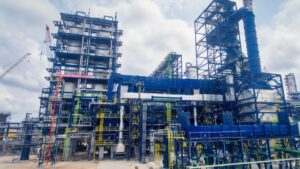


We don’t owe IBEDC N495m electricity bill — UCH
University College Hospital (UCH), Ibadan, says it does not owe Ibadan Electricity Distribution Company (IBEDC) N495 million bill, as being insinuated.
UCH’s Public Relations Officer (PRO), Mrs Funmilayo Adetuyibi, stated this in a statement made available to journalists on Wednesday in Ibadan.
Recall that IBEDC had disconnected the power supply to UCH due to what it called accumulated bills of N495 million, thus throwing the facility into darkness.
Adetuyibi, however, said that it was not true that the hospital had an accumulated bill of N495 million over the last three years.
She said that the present UCH administration, led by Prof. Jesse Otegbayo, assumed office on March 1, 2019 and inherited over N270 million as at Feb. 27, 2019, adding that it had since ensured the monthly payment of bills brought by IBEDC.
According to her, the UCH management has also been settling the backlog of bills inherited from previous administrations.
“This management has had meetings with the IBEDC management on several occasions.
“Aside that, a payment plan on how to offset the backlog of the outstanding debt has been forwarded to both the consultant of IBEDC and the regional head of IBEDC.
“This payment plan was rejected by IBEDC. They insisted that the first payment of N250 million should be made within three months.
“This management’s catchphrase is ‘patients’ comfort and staff welfare.’ In essence, the issue of power supply and water supply to the hospital are critical to our operations.
“While we can say that we have outstanding bills to settle with the IBEDC, the hospital management has left no stone unturned in our proactive approach in making sure our teeming patients have access to adequate medical care at all times,” she said.
Adetuyibi denied the report that the hospital spends N160 million on diesel on a monthly basis, adding that only an average of N17 million was being expended on diesel per month.
She also said that UCH had never experienced 24-hour power supply from IBEDC, according to the records of the hospital’s internal audit department.
“The narrative of patients’ relations buying sachet water does not also arise. Even though the hospital does not have optimal water supply due to power outage, we rely on the generator to pump water.
“The hospital has only 45 generators. Out of these 45 generators, some are due for servicing while some are due for replacement,” she said.
Adetuyibi further stated that the hospital’s management had also made available solar inverter in some areas, including all out-patients’ clinics, Accident and Emergency Department, Endoscopy Suites, ECG Suites, Staff Clinic, Owena Dialysis Ward and Medical Microbiology Department, among others.
“As stated earlier, the contention we have with IBEDC is the old bill inherited by this current administration.
“This year, we have received a bill of N147 million. We paid N50 million in January 2024, N55 million in February 2024 and N45 million in March 2024, totalling N150 million,” she said.
The public relations officer added that IBEDC was insisting that the hospital must pay the inherited bills, whereas it (UCH) had been settling the old bills along with current bills.
She said the management had appealed to the electricity distribution company on several occasions not to charge UCH on commercial rates because of the fact that it renders social services.
“But our appeals have not had the ears of the company.
“However, in order to mitigate the effect of power outages, the hospital has set up an energy committee.
“The committee is charged with the responsibility of raising funds for the payment of electricity bills, to have funds to provide solar-powered energy to other service areas in the hospital.
“Aside that, the energy committee is charged with finding a lasting solution, in the short and long term, to the energy problem.
“We plead with well-meaning individuals, corporate organisations and the international community at large to come to the aid of the hospital.
“UCH is a national heritage; our collective legacy, and the onus of maintaining it lies on us all,” Adetuyibi said.



